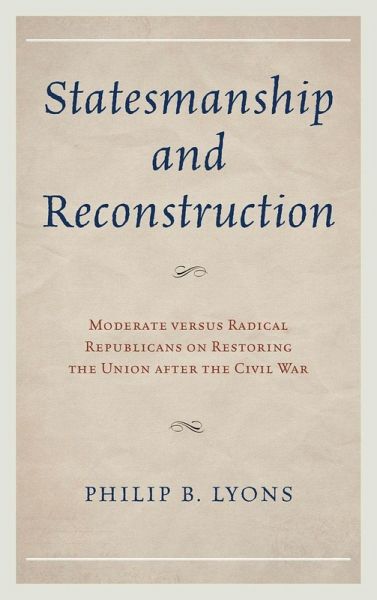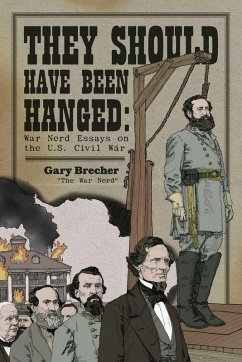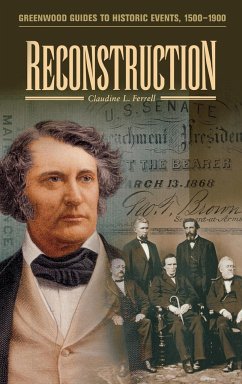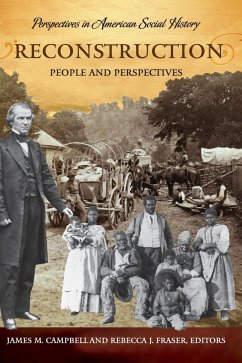
Statesmanship and Reconstruction
Moderate versus Radical Republicans on Restoring the Union after the Civil War
Versandkostenfrei!
Versandfertig in 1-2 Wochen
149,99 €
inkl. MwSt.
Weitere Ausgaben:

PAYBACK Punkte
75 °P sammeln!
Besides massive race prejudice and the perceived vindictiveness of the radical Republicans, another factor that contributed strongly to the derailment of reconstruction after the Civil War was the conflicting decisions taken by the political leaders. Lincoln warned against differences between the friends of freedom, and to overcome these, took charge of the reconstruction of Louisiana and showed how it should be done by pitting benefits of enlightened free government against the prejudices of the populace. Unfortunately, his example was lost on his successor, Andrew Johnson, whose encouragemen...
Besides massive race prejudice and the perceived vindictiveness of the radical Republicans, another factor that contributed strongly to the derailment of reconstruction after the Civil War was the conflicting decisions taken by the political leaders. Lincoln warned against differences between the friends of freedom, and to overcome these, took charge of the reconstruction of Louisiana and showed how it should be done by pitting benefits of enlightened free government against the prejudices of the populace. Unfortunately, his example was lost on his successor, Andrew Johnson, whose encouragement of Southern resistance to the North's terms aggravated factionalism within the Republican party. The moderates dominated in the drafting of the Fourteenth Amendment, where they incorporated the statesmanlike principle of a benefit, self-government in exchange for Southerners protecting the rights of all their citizens, black and white. However, this statesmanlike bargain was practically abandoned in Congress's response to the Southern states' rejection of the Fourteenth Amendment, the Congressional Reconstructions Act. The fears of the moderates that the new state governments would not protect rights led them to propose universal suffrage, while the fears of the radicals that disloyal men would rule led them to provide for the disfranchisement of many ex-rebels and to hold any governments established, provisional only, subject to congressional change at will. As result the incentive for native white Southerners to participate in the new state governments in exchange for rights protection was drastically weakened. The consequences of this legislative "straight jacket" made it extremely difficult for Republicans in the defeated states to establish permanent political footholds. Some tried to hold onto power without attempting to cultivate native white support and lost their states for the Republicans. Three other leaders' efforts to strike a balance between radicals and Democrats fell flat. Imprudent decisions of the Grant Administration shattered the attempts of three more states to establish a common ground with moderate Democrats. On the positive side, there was a leader in Virginia who figured out the kind of political arrangement necessary for Republicans to survive, and in Florida, a moderate Republican Governor, Ossian Bingley Hart, exercised real statesmanship to lead the most successful of all reconstruction governments. Statesmanship in reconstruction could have spared the South some severe hardships. Despite the vast change in public opinion on race relations over the last nearly 150 years, there are still lessons drawn from this study that can be applied to present day Civil Rights Policy.













